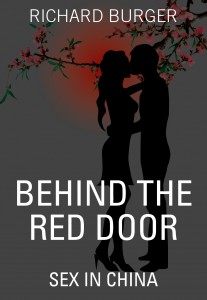
For the past several months I’ve made allusions to being too busy to blog due to a “big project” I was working on. Now, after about ten months, I can tell you all about it.
Behind the Red Door: Sex in China is the title of my new book that will be published by Earnshaw Books on September 1. It’s the first book I’ve written and was undoubtedly the most arduous, enlightening, demanding, enjoyable, challenging and exhilarating experience of my life to date.
To my knowledge, there is no comparable book on the market — a book that tells the story of sex in China in a format designed for the general reader. After I agreed to write the book, I immersed myself in every piece of information I could find. I tracked down both out-of-print and contemporary textbooks, the most recent studies written for scholars by scholars, white papers, graduate theses, newspaper articles, online resources, anything that I felt could give me fresh insights into this immense subject. For months, I simply sifted through my materials, taking notes and trying to break down complex issues into a cohesive narrative that would be accessible to all.
I didn’t limit myself to written sources, of course. I did interviews by phone, Skype and email with people who had knowledge about specific areas I was trying to cover. Researchers at Earnshaw Books provided many invaluable interviews with the translations so I could humanize the story. In particular, their interviews with prostitutes, pimps, sex shop owners, sex therapists and “sex detectives” hired by suspicious spouses — all of these along with my own interviews provided me with a deep well of resources to draw on.
Topics include prostitution, sexual habits and attitudes through China’s long history and how they impact on sexuality in China today, same-sex love, the Internet’s deep impact on Chinese perceptions of sex, the mushrooming sex shop industry, and that strange phenomenon, “yellow fever.”
John Pomfret, author of Chinese Lessons: Five Classmates and the Story of the New China, said of the book, “In telling a great story of the history of sex in China, Richard Burger peels back the curtain on the private lives of the world’s most populous nation.”
Much is covered, but it’s impossible to tell the complete and absolute story of sex in China. As we’ve discussed many times on this blog, there is more than one China, rich China and poor China, the China of Shanghai/Beijing and that of the lower-tier cities and the countryside, the China of those who grew up during the Cultural Revolution and those who are entering college today. As I say in the Introduction:
Drawing together China’s past and present attitudes toward this most basic human necessity and arriving at a neat conclusion is difficult. Any discussion of sex in China can only be suggestive. Every point an observer makes can be argued and contradicted. The best we can do is pull together the various conversations on what sex and sexuality in today’s China means, and hope to offer as balanced a picture as possible.
The book goes into considerable detail and is not safe for work (the section on Daoist sex manuals is particularly graphic), but I strived to keep it informative without crossing into the vulgar.
Obviously, I would like all of you to pre-order the book, which you can do over here. The more pre-orders there are, the more resources Amazon will allocate to promote the book.
My sincere thanks to all of my friends — and especially my publisher — who helped me to write and promote this book. It’s been a wonderful experience, and difficult as it often was, I’m almost sorry the writing part is over. There is always more to learn about China, and every day I see a piece of news or read a new blog post that I think would be perfect addition to my book. Thus no book on this subject can ever be truly complete or definitive, though it can certainly be informative and a lot of fun as it tries.
More about the book as the publication date approaches. In the meantime, please “Like” the Behind the Red Door: Sex in China Facebook page and feel free to post there anytime. I’ll be putting up news related to sex in China in general, and my book in particular, on a regular basis. (The FB page is a work in progress for now, but please Like it anyway; I’ll be filling it in soon.)
It is thrilling to finally announce this. I do hope you get hold of a copy of the book; I don’t think you’ll be disappointed, prejudiced though I may be.


